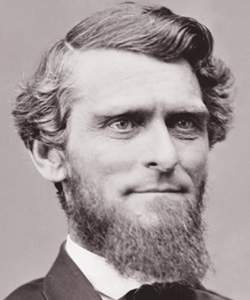Arthur Inghram Boreman (Congressional Biographical Directory)
Reference
BOREMAN, Arthur Inghram, a Senator from West Virginia; born in Waynesburg, Pa., July 24, 1823; moved to Virginia with his parents, who settled in Middlebourne, Tyler County, in 1827, and in Moundsville, Marshall County, in 1840; attended the public schools; studied law; was admitted to the bar in 1843 and commenced practice in Parkersburg; member, Virginia house of delegates 1855-1861; presided over the convention of supporters of the Union of the northwestern counties of Virginia held at Wheeling, June 19, 1861, to form the new State of West Virginia; elected judge of the circuit court, nineteenth circuit of Virginia 1861-1863; the first Governor of West Virginia 1863-1869, when he resigned to accept the nomination as United States Senator; elected as a Republican to the United States Senate and served from March 4, 1869, to March 3, 1875; was not a candidate for reelection in 1874; chairman, Select Committee on the Removal of Political Disabilities (Forty-second Congress), Committee on Territories (Forty-third Congress); resumed the practice of law in Parkersburg, W.Va.; elected judge of the circuit court for the fifth judicial circuit of West Virginia in 1888 and served until his death in Parkersburg, Wood County, W.Va., April 19, 1896; interment in the Odd Fellows Cemetery.
"Boreman, Arthur Inghram," Biographical Directory of the United States Congress, 1774 to Present, http://bioguide.congress.gov/scripts/biodisplay.pl?index=B000638.
Arthur Ingram Boreman (American National Biography)
Scholarship
From 1855 to 1861 Boreman represented Wood County in the Virginia House of Delegates as a Whig, opposing the dominant Democratic party, which he believed chiefly represented the planter and slaveowning interests of eastern Virginia. During the secession crisis, he joined the Unconditional Unionists in opposing secession, which he feared would mean the end of the best government in the world and a future of "impenetrable gloom."
Because of his outspoken Unionist stand, Boreman was chosen to preside over the Second Wheeling Convention (11-25 June and 6-21 Aug. 1861), which first organized a Restored Government of Virginia and then moved toward creation of a separate state. After the Second Wheeling Convention and while the movement for a separate state proceeded, Boreman served as a circuit judge of Reorganized Virginia, which, led by Governor Francis Pierpont, administered the Unionist counties of western Virginia from Wheeling.
Because of his outspoken Unionist stand, Boreman was chosen to preside over the Second Wheeling Convention (11-25 June and 6-21 Aug. 1861), which first organized a Restored Government of Virginia and then moved toward creation of a separate state. After the Second Wheeling Convention and while the movement for a separate state proceeded, Boreman served as a circuit judge of Reorganized Virginia, which, led by Governor Francis Pierpont, administered the Unionist counties of western Virginia from Wheeling.
Jerry Bruce Thomas, "Boreman, Arthur Ingram," American National Biography Online, February 2000, http://www.anb.org/articles/04/04-00122.html.



